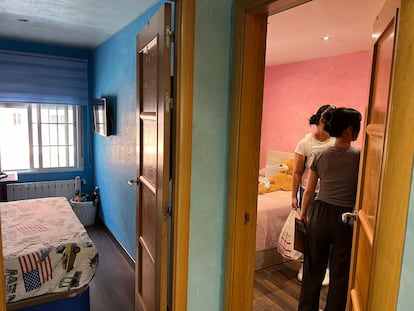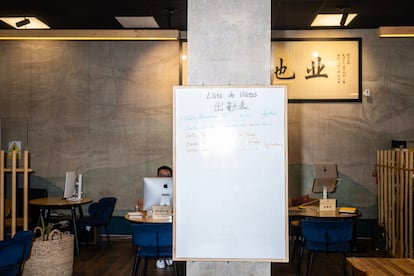Mrs. Deng is on the hunt for Spain’s last ‘golden visas’
Specialized real estate agencies are detecting a spike in interest from foreign investors who want to obtain residency in exchange for buying a home. The surge comes following news that the government wants to end what it terms ‘a speculative investment model’

A Tesla Model 3 parks on the street so that Mrs. Deng can see her future home. Emilio Zhong, 31, gets out of the white sports car to open the back door for this Chinese-born investor. He points to the walls of the four-story block where her apartment is located, next to a vacant lot near 12 de Octubre Hospital. Mrs. Deng, 50, has been in Madrid for almost a month, attracted by “the light and the freedom,” she says, but above all motivated by the possibility of being one of the last beneficiaries of the so-called “Golden Visa” program, introduced in 2013 by former conservative prime minister Mariano Rajoy as a fast-track way to obtain residency papers in Spain in exchange for purchasing at least €500,000 ($560,000) worth of real estate or by investing in business projects.
Spain’s current prime minister, Pedro Sánchez of the Socialist Party (PSOE), announced on April 8 that he would eliminate these golden visas for foreigners. “We do not want a speculative investment model,” he said, adding that 94 out of every 100 visas obtained by this legal procedure tied to real estate investment are concentrated in large cities such as Madrid, Barcelona, Málaga, Alicante, Valencia and Palma de Mallorca. The legal text that will annul this type of visa was filed in the Congress of Deputies in late July, but “it is not yet known when the law will be processed,” said a source at the Ministry of Housing. “Let’s hope it does not take long.”
Emilio Zhong, the executive director of the realtor Eticasa Servicios Inmobiliarios, who arrived in Spain at the age of 12 with his parents from the coastal city of Quingdao (eastern China), says that these days they are working full tilt, as if the tap “was going to be turned off tomorrow.” Ever since Sánchez announced the end of the program, demand from Chinese investors has tripled, says Zhong from the heart of Usera, Madrid’s Chinatown district. “We no longer need to go looking for clients, they come to us. Both buyers and sellers. The urgency is noticeable,” he explains.
Sales have not increased to the same extent due to the lack of supply of homes to sell in the capital, but the procedure to acquire a property has been reduced “to the bare minimum.” “Negotiation no longer exists, there is no time for it. They know that there is a line of people waiting behind them. Investors who were looking for advice for a future purchase in two or three years are now in a hurry to buy. This makes it much easier to close a deal,” says the real estate agent. In search of speed, real estate agencies working with foreign investors are rushing to buy properties that are free of mortgages or other forms of debt. “We need to do it as soon as possible,” adds Zhong.

In mid-August, a 45-year-old Spanish man, married with two children, who works for Madrid City Hall, walked through the door of Eticasa to sell his recently renovated property, a first-floor apartment of 100 square meters, with three bedrooms and a bathroom, less than 30 years old. The asking price: €240,000 ($270,000). The real estate agency, which charges 3% to the buyer and the seller respectively, would pocket around €40,000 ($45,000) gross for the operation, including the costs of processing the golden visa.
After checking the database of interested investors, they saw that Mrs. Deng was the right person. Yang, a 26-year-old Spanish woman of Chinese descent, would be the commercial broker in charge of ensuring that the operation became effective in less than 15 days, the objective that the company has set for itself in this type of transaction.
Ms Deng is a small business owner in Sichuan province, who plans to buy up to three houses in Madrid at once with the money she earns from selling her own property in China. “In the last 30 years, the Chinese economy has grown a lot, especially in the real estate sector. Houses in Beijing and Shanghai have multiplied in value. Spain is one of the most affordable countries in Europe to make an investment. Generally, it is not the rich who come here, it is the middle class. People with money go directly to the United Kingdom,” says Zhong.
The woman thus fits the most common profile of a Chinese investor, according to the director of the real estate agency: it is no longer the way it was in the 1990s, when working-class people from the countryside with little formal education came to make a living in Spain by working in the services sector. Now, and especially since the golden visa program was regulated in the midst of the financial crisis, the trend is for citizens from more affluent classes, who are looking for a house of around €250,000 ($280,000) to move into, and one, two or more to rent and obtain an income of around €2,000 ($2,230) a month. Their children, unlike those of the first generation, will go to private schools with a view to making the leap to European universities.
According to a report by Transparency International published in 2023, Chinese citizens, along with Russians, have been the main beneficiaries of the golden visa program in Spain. Since 2013, 2,712 visas have been granted to investors from the Asian country, of which 99.33% have been issued under the assumption of the acquisition of real estate.
For Héctor Pérez, from the law firm Seiler Abogados, “the elimination of the golden visa program in Spain is not as worrying as it would be to eliminate the special tax regime for foreign workers, commonly known as the Beckham Law [so named after the soccer player] That’s where the business lies.” He acknowledges that there has been an upturn. Of the 14,000 golden visas issued in 10 years, 3,500 have been granted between 2022 and 2023. But he doubts that the measure will alleviate housing prices. “The elimination of the golden visas is not going to stop straining the market. We can already see what happened in Portugal, where the results are totally disappointing,” he notes, referring to similar measures that the neighboring country undertook months ago.
“The problem with this golden visa is that people with a lot of money come here to enjoy themselves, but not to work in Spain,” Pérez continues. “What they do is live here and continue to maintain their businesses in their countries of origin. This happens especially with Latin Americans, who have found their own Paris in cities like Madrid, Barcelona or Valencia. That is why the centers of these cities are under pressure, because high net worth individuals have been living here for 10 or 15 years off the money they earn in their own countries,” he concludes.
With the air of a clueless tourist, Mrs. Deng goes to her appointment at the real estate agency. Rather than an office, it looks like a co-working space. The average age of its 14 employees is 26 years old, and being fluent in both Chinese and Spanish is mandatory. A whiteboard announces the visits planned for the day.

As she gets out of the Tesla to view the apartment, the commercial broker, Yang, kindly lets Mrs. Deng go up the stairs of the building, which has no elevator. The door of the unit is already open and the lights are on. The owner and his two sons remain in the living room at all times, each with his cell phone, without saying a word to either the women or to Zhong. The walls, covered with fuchsia-colored vinyl wallpaper, do not seem to convince Mrs. Deng, although her face changes when she enters the kitchen and sees the furniture, the refrigerator, the microwave and the dishwasher. “Can we keep this?” she says to the real estate agent. “I’m afraid not, the family will take almost everything,” she answers.
After walking through the rooms and looking at the bathroom, Mrs. Deng concludes the visit. In a few days she will make the payment and in a few months she hopes to have the apartment renovated so that her mother, her husband and her two children can live there. She will also find a private school for the kids in the next few days if she has the time. With a bit of luck, they will set up a business and live well off the rent from the other two apartments.
As she walks out, the woman discovers what will be her garage at the back of the block and excitedly takes out her mobile phone to take a burst of photos. Then she remembers the question she had not dared to ask until now:
— When will the golden visas run out, Emilio?
Emilio shrugs: “We’ll let you know,” he says, before opening the door of the sports car for her.
Sign up for our weekly newsletter to get more English-language news coverage from EL PAÍS USA Edition
Tu suscripción se está usando en otro dispositivo
¿Quieres añadir otro usuario a tu suscripción?
Si continúas leyendo en este dispositivo, no se podrá leer en el otro.
FlechaTu suscripción se está usando en otro dispositivo y solo puedes acceder a EL PAÍS desde un dispositivo a la vez.
Si quieres compartir tu cuenta, cambia tu suscripción a la modalidad Premium, así podrás añadir otro usuario. Cada uno accederá con su propia cuenta de email, lo que os permitirá personalizar vuestra experiencia en EL PAÍS.
¿Tienes una suscripción de empresa? Accede aquí para contratar más cuentas.
En el caso de no saber quién está usando tu cuenta, te recomendamos cambiar tu contraseña aquí.
Si decides continuar compartiendo tu cuenta, este mensaje se mostrará en tu dispositivo y en el de la otra persona que está usando tu cuenta de forma indefinida, afectando a tu experiencia de lectura. Puedes consultar aquí los términos y condiciones de la suscripción digital.









































